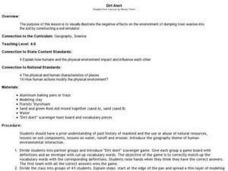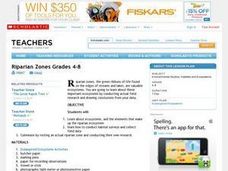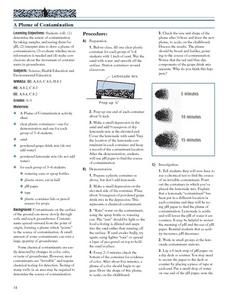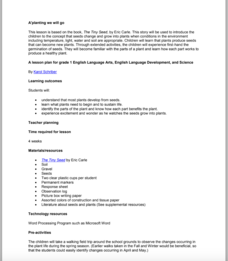Curated OER
Ecology: Factors Influencing Animal Populations
Students assess the factors affecting animal populations. Working in groups they define specific vocabulary terms and complete several activities from "Project Wild."
Curated OER
The Trail of a Snack Food
Students identify some of their favorite snack foods. Using this information, they discover the resources needed to produce the food. In groups, they research different alternatives to make their favorite food in order to protect the...
Curated OER
Going in Cycles: The Life of an Aluminum Can
Learners explore the life cycle of aluminum cans. In this recycling lesson, students review the manufacturing process and how to make a closed loop cycle. Learners also have the opportunity to present what they've learned to others...
Curated OER
Water Quality Monitoring
Young scholars comprehend the four parameters of water quality. They perform tests for salinity, dissolved oxygen, pH and clarity or turbidity. Students comprehend why scientists and environmental managers monitor water uality and...
Curated OER
Dirt Alert
Students explore the environment and effects of pollution. They participate in a "Dirt Alert" scavenger game to study vocabulary words. Students construct a soil simulator to visually illustrate the negative effects on the environment of...
Curated OER
The Chemistry of Coal
Students investigate the chemistry of coal. This lesson serves as a review of conservation of mass, simple reactions and equation balancing. During the lesson, students research chemical components of coal, as well as environmental...
Curated OER
Decomposers at Work!
Students design and conduct investigations that illustrate the process of decomposition. After a lecture/demo, students simulate the process of soil composting in the classroom. They closely chart the decomposition of their soil.
Curated OER
TE Activity: Cool Views
Students define preservation and conservation before listening to an article read by the teacher about John Muir and Gifford Pinchot, famous environmentalists. They complete a Venn diagram before deciding which side of this environmental...
Curated OER
Worm Composting: Vermiculture
Students compost in a limited space and describe the decomposing process. Students convert unwanted, organic matter, particularly food scraps and paper into fertile soil.
Curated OER
Regions: Meet the Experts Presentation
Students gather information and create a web site on prairies and plains using a variety of resources, including the internet.
Curated OER
Bioremediation
Young scholars design and conduct investigations that illustrate the effect bioremediation has on organic matter and determine environmental applications. They, in groups, present their findings to the class.
Curated OER
Riparian Zones Grades 4-8
Students examine and analyze the Riparian Zones found on the edges of streams and lakes. They assess why those are such valuable ecosystems and then conduct actual field research on riparian zones and conclude by drawing conclusions from...
Curated OER
Plant Diversity and Distribution
Students construct a defined plot on school grounds and observed patterns in plant life. They count trees, shrubs, cacti and record on a data sheet. They compare data and generate a plant diversity overlook for their school.
Curated OER
'Round and 'Round it Goes!
Students discuss and interpret background knowledge on poster copy given on the water cycle. Students complete the included activity sheets using the poster as a reference in small groups. Students identify and name where water can be...
Curated OER
Water Filtration Competition
Students design water filtration systems. They draw sketches and write paragraphs about their systems. After presenting their systems to the class, each group then builds their system and determines its effectiveness for purifying...
Curated OER
Discovering the Wetlands!
Students name wetland plant and animal life. In this ecosystem lesson students go birdwatching and interpret native plants through art.
Curated OER
Freddy the Fish
Students complete an experiment. In this water pollution lesson, students brainstorm information about river habitats and water pollution. Students then read the story Freddy the Fish and complete an experiment where they use a...
Curated OER
Ecosystems and Climate
Students examine climatic effects on ecosystems. They plant tomatoes and observe the differences in plant growth with differences in light. They create picture collages of plants, animals, and insects found in each climate of the U.S.
Curated OER
Florida's Springs
Students calculate the water usage for irrigation of school grounds. They use maps in determining which areas are irrigated.
Curated OER
Earthworm Bridge
Fourth graders complete analysis experiments for decomposers and their adaptable traits. In this decomposers lesson, 4th graders test worm behavior to light, sound, warmth, touch, and moisture. Students work in groups to analyze the...
Curated OER
Florida's Springs
Students illustrate how water is stored and the water cycle. They discover how underground water can become contaminated.
Curated OER
A Plume of Contamination
Students perform an experiment/investigative simulation regarding the movement of contaminants in groundwater. They test the pH of three water samples, and then use their reasoning skills to determine the source of an invisible...
Curated OER
A'planting We will Go
Germination is an amazing process that results in amazing things. The book The Tiny Seed is the inspiration for a set of activities that will help build early literacy, observation, language, and writing skills. The class observes how...
Curated OER
Exploring our National Parks
Students utilize maps/Atlases to find key spatial information, locate U.S. National Parks, characterize the geography of a specific region, and create a National Park brochure.

























